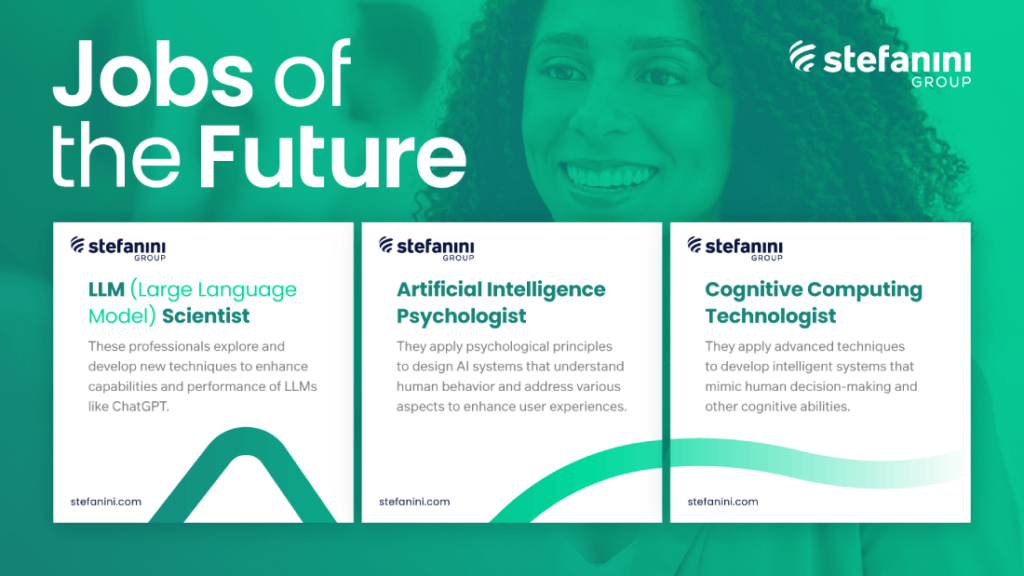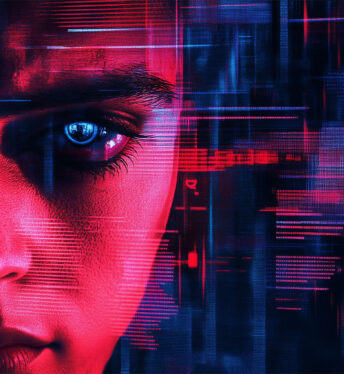The world of tech is constantly evolving, causing new opportunities to emerge. Learn about how new advancements in areas like AI, Analytics, Cybersecurity, and more, are changing demand and creating new jobs.
When you work in tech, you have to be able to predict the future- at least in some capacity. To remain relevant and competitive, tech companies must stay on the cutting edge of new tech, but also be aware of constantly shifting trends, customer desires, and market needs. This allows us to determine where to dedicate our resources to make us the most attractive option for clients, and ensure we don’t fall behind the competition.

The U.S. Bureau of Labor Statistics (BLS) predicts that over the next decade (2020-2030), employment in information technology will increase by around 13%. This is significantly higher than the national average estimate of 8%. (study.com)
The BLS forecasts that job areas with the greatest focus will be cloud storage, data management, and information security. In addition, we believe that artificial intelligence and LLMs (Large Language Models) like ChatGPT will become increasingly prevalent in the coming years.
We sat down with Fabio Caversan, VP of Innovation and Digital Business at the Stefanini Group, to discuss the jobs of the future, define them, and detail the roles they will play. In addition to AI focused professions, we believe the tech jobs of the future will fall into the following categories:
- Artificial Intelligence and Machine Learning
- Data Science and Analytics
- Cybersecurity and Information Security
- Virtual Reality and Augmented Reality
- Blockchain and Cryptocurrency
- Green and Sustainable Technologies
- Robotics and Automation
In this article, we will define these categories and share a few of the jobs that we predict will be in high demand in the coming decade.
Artificial Intelligence and Machine Learning
Perhaps generating the biggest buzz currently is Artificial Intelligence technology, specifically ChatGPT and other LLMs. Capable of generating thousands of words with just a simple prompt from the user, LLMs promise to change work as we know it. With this development comes the need for professionals who understand this powerful tech, and can make it even better.
“With the advent of the Large Language Models (LLMs), a result of decades of advances on the neural networks field, going through deep learning, transformers and such, a huge set of new professions will emerge. This revolution is being compared to the internet or smartphones. It is, in the end, a platform that will be used to build a universe of new technologies, products and solutions. People that understand, create and maintain these huge LLM environments will be the first necessary professionals, like LLM Scientists, Architects, Data Engineers and even Psychologists defining what LLM’s goals and rules should be embedded in each application.”
– Fabio Caversan, VP of Innovation and Digital Business, Stefanini Group.
LLM (Large Language Model) Scientist
Although LLMs have great potential, without clear and detailed prompts, they will not function the way we want them to. A LLM Scientist conducts research, explores new techniques, and develops innovative algorithms to enhance the capabilities and performance of large language models; advancing the field of natural language processing and driving breakthroughs in human-like text generation and understanding.
AI Psychologist
This professional applies psychological principles and techniques to design, develop, and evaluate AI systems that enhance user experiences, understand human behavior, and address psychological aspects such as emotion recognition, personalization, and ethical considerations.
Cognitive Computing Technologist
Fitting more into the Machine Learning part of this category, a Cognitive Computing Technologist applies advanced technologies and techniques, such as natural language processing and machine learning, to develop intelligent systems that mimic human cognitive abilities and provide data-driven insights for decision-making and problem solving.
Data Science and Analytics
Data is everywhere, and with it comes potential for so many things- ability to understand your user base, ability to effectively target new customers, the ability to predict shifts in the market. However, data is largely useless if you don’t have the right tools to analyze and understand it.
Algorithm Bias Auditor
Algorithms are present in many different forms- from Tiktok’s curated FYP (For You Page), dating options on Tinder, musical playlists offered by Spotify, and more. Algorithms are a way to sort through data, but they can end up unbalanced. That’s where the Algorithm bias auditor comes in. They seek to maintain the fairness of the workforce and assist in optimizing algorithms to ensure that users have equal access to resources. The World Economic Forum claims that they also power the modern employment process, which includes serving up applicants to recruiters and teeing up job listings to job searchers. In short- they will ensure fairness in a wide variety of digital spaces. (linkedin.com)
Quantum Data Analyst
Unlike traditional computers, quantum computers can find patterns quickly in large scattered data sets. They can do calculations in seconds that would take non-quantum computers thousands of years to complete. Quantum computing offers high-speed detection, analysis capabilities, and diagnosis that was once thought to be impossible. (nobledesktop.com)
Using these computers, quantum data analysts will be able to measure quantum information and help businesses upgrade to quantum level encryption.
Cybersecurity and Information Security
With more and more information available online, cybersecurity is an essential industry. As new tech develops, so too does the amount of people trying to exploit it. Cybercrime is at an all-time high- and making sure users are secure in online/digital spaces will take many forms.
Cybersecurity Brain-Machine Interface (BMI) Ethicist
Sounding like a job straight out of science fiction, a Cybersecurity BMI Ethicist addresses ethical and privacy concerns related to the use of brain-computer interfaces in cybersecurity applications, ensuring the responsible and secure implementation of BMI technologies.
Cybersecurity Neurohacker
Oftentimes user error or oversight are the greatest variables of vulnerability. In this job, an individual explores the intersection of neuroscience and cybersecurity, studying the human brain’s response to cyber threats and developing strategies to enhance user awareness and resilience.
Cybersecurity Biometrics Analyst
Focuses on securing biometric systems, such as fingerprint and facial recognition technologies, ensuring the privacy and integrity of biometric data.
Virtual Reality and Augmented Reality
Virtual and Augmented Reality has advanced in leaps and bounds in the past few years. With developments like the Metaverse, gaming VR headsets like Oculus, and the anticipated Apple Vision Pro, the potential of AR/VR is being explored increasingly every day, including the unique opportunities it provides.
AR/VR Builders
Professionals who can design immersive environments, develop interactive experiences, and create virtual worlds in various sectors such as gaming and entertainment, as well as more unexpected fields like construction, retail, manufacturing, and interior design.
Blockchain and Cryptocurrency
Cryptocurrency, such as Bitcoin, Ethereum, Tether, and many others, is a digital currency created using encryption algorithms through the blockchain. Because of this, it can’t be counterfeited or double-spent. It’s largely unregulated and decentralized, relying entirely on digital records in the blockchain that give it its value. This relatively new tech creates many new jobs to help improve the encryption, create additional security, and help people understand this system of payment.
Blockchain Architect
Designs and oversees the technical architecture of blockchain solutions, including network infrastructure, data models, and consensus mechanisms to ensure scalability, security, and optimal performance.
Blockchain Scientist
Conducts research, explores innovative algorithms, and develops cutting-edge technologies to advance the field of blockchain, addressing challenges and driving advancements in scalability, security, and consensus mechanisms.
Digital Currency Advisor
Just like a traditional financial advisor, digital currency advisors specialize in these currencies and teach people how to use the right balance of systems to optimize their savings- without getting scammed or making risky decisions in an unregulated market. (Linkedin.com)
Green and Sustainable Technology
It has never been more important to develop eco-friendly technology, and find the right people to design and implement it. Sustainable technology could mean the difference between whether or not our planet is habitable in the next century.
Sustainable Energy Engineer
As the world focuses on renewable and clean energy sources, professionals who specialize in designing, implementing, and managing sustainable energy systems will be essential. This includes applying the principles of energy conversion and use, and investigating potential renewable energy sources, such as wind energy, solar energy, geothermal energy, hydroelectric energy, or nuclear energy, among others.
Robotics and Automation
Robotics and industrial automation employ computers, control systems, and information technology to operate machines and processes in the industrial sector, substituting manual labor and enhancing productivity, speed, quality, and performance.
Human-Machine Teaming Manager
“There may be no other position that puts its occupant in the middle of the future of work quite the way the role of human-machine interface manager does.” (linkedin.com) This role coordinates the work within teams of humans and machines, ensuring work is divided strategically, and all members of the team work efficiently and effectively.
Robotics Troubleshooter
Time spent with downed machinery/systems could result in financial losses or production slowdown that could hurt a company. That’s why it’s essential to have someone to keep things running smoothly. This important worker is responsible for identifying, diagnosing, and resolving technical issues or malfunctions in robotic systems. They analyze the behavior and performance of the robots, use diagnostic tools and techniques to pinpoint problems, and apply their expertise to troubleshoot and fix any faults or errors. Their role involves investigating electrical, mechanical, or software related issues, implementing solutions, and ensuring proper functioning of robotic systems.
In Closing
Of course, not every job of the future will neatly fall into one of these categories. Some jobs of the future fit into multiple categories, such as a Cybersecurity AI Analyst, or IoT Innovator. Some are in a category of their own. The list we provided is just a glimpse at some of the jobs of the future- a list that will no doubt continue to grow and develop as we continue to make advances in technology.
According to a poll we posted on LinkedIn, a majority of people who responded (59%) said they feel their skillset is in line with the jobs of the future. Only 6% said no.
Regardless of what exactly the future looks like, and what jobs are at the forefront of our industry in the coming decades, at Stefanini, we’re in good shape to embrace it all! And we hope you are too.



















